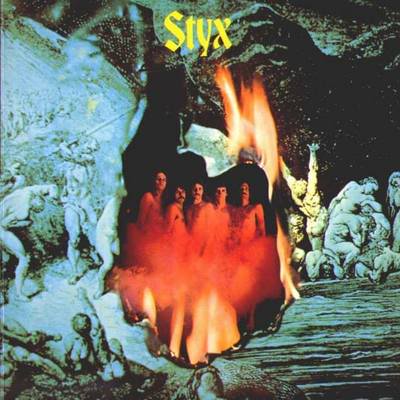
Styx I (1971)

1.Movement for the Common Man
-Children of the Land
-Street College
-Fanfare for the Common Man
-Mother Nature's Matinee
2.Right Away
3.Best Thing
4.After You Leave Me
5.What Has Come Between Us
6.After You Leave Me
The road to even modest recognition was a long and winding one for the Chicago-based band that would eventually become known to the world as Styx. Like many groups from America’s heartland, they lacked the hipster cool of the coasts and the scene connections of the U.K. invasion. Instead, they simply played—tirelessly, relentlessly—touring incessantly and recording what might politely be called uneven material.
The band’s core—Dennis DeYoung on keyboards and vocals, twin brothers Chuck and John Panozzo on bass and drums respectively—dated back to the mid-1960s. At first, they were little more than a basement wedding band, scoring the occasional high school dance or family event. It wasn’t until around 1971 that a serious effort emerged, and by that time the group had added guitarists James “JY” Young and John "JC" Curulewski. A record deal, any record deal, seemed like a miracle. They signed with the diminutive Wooden Nickel label for a four-album run. It would be generous to say the label returned the favor with any meaningful promotional backing.
The resulting debut album, simply titled Styx I, offers little in the way of lasting contribution. It is a scattered, directionless affair—so much so that even calling it a “typical debut” seems overly charitable. Most of the compositions weren’t even written by the band, possibly a result of either label pressure or a lack of internal confidence. Either way, the result was the same: a record that struggled to define itself, musically or otherwise.
There was, however, a modest bright spot. The track Best Thing managed to chart—just barely—on the Billboard Hot 100. It scraped into the high 80s, but it was enough to keep the dream alive. A minor miracle, given the rest of the material.
The album opens ambitiously (and, ultimately, ineffectively) with Movement for the Common Man, a multi-part “suite” that reveals more about the band’s aspirations than their abilities. The most baffling section, Street College, consists entirely of overheard dialogue from working-class men opining about “today’s youth.” Whether this is intended as satire or sincerity is never quite clear. If it’s supposed to provoke thought, it mostly provokes confusion.
Musically, the attempt to reinterpret Copland’s Fanfare for the Common Man is poorly conceived and badly executed—especially in the wake of Emerson, Lake & Palmer’s vastly superior version, released not long after. The suite’s only redemption is DeYoung’s Mother Nature’s Matinee, which stands as an early indicator of the melodic balladry he would come to master. It’s light, delicate, and far more convincing than anything else on offer here.
The rest of the album passes without much distinction. It’s perhaps telling that it wasn’t reissued on compact disc until the late 1990s—and then mostly for archival purposes. Like so many first albums by later-successful acts, this one is more a curiosity than a foundation. It belongs to the collectors, not the casual listener.
Go back to the main page
Go To Next Review